Stephen King wasn’t messing around. His new publisher was getting double barreled capital L literature from the Viscount of Vomit. First there was the high-blown gothic, Bag of Bones, then came the small and spiritual Girl Who Loved Tom Gordon, and now here was Hearts in Atlantis—a series of Linked Novellas. Could there be a literary form more twee and precious than Linked Novellas?
And these weren’t just any linked novellas, but linked novellas about the Sixties and the Vietnam War (which King missed due to his busted eardrums and flat feet) which is basically a core requirement to attain one’s Serious Man of Letters certificate. Scribner was so thrilled about what they received from their expensive new author that on the cover they simply wrote “New Fiction” rather than cluing readers in that this was either a novel told in parts, or Linked Novellas, or a collection of short stories. Hell, they probably didn’t even know themselves.
For those seeking evidence that King was capable of cravenly craving ivory tower acceptance, here was the smoking gun. I mean, if his more MFA writer’s workshop experimental stories like “The Man Who Loved Flowers” and “Morning Deliveries (Milkman #1)” gave you a pain in the brain, wait until you read the all-metaphor, all-the-time “Blind Willie.” And if you, like me, get annoyed by the way King’s Dark Tower series compulsively crept into everything he was writing during this period, then wait until you see how he jams it in here. On the other hand, Hearts in Atlantis suggests a very different Stephen King. A King who wrote for his University of Maine literary journal, Ubris, then graduated to newsstand literary journals like Tin House rather than men’s magazines like Cavalier. And that’s not meant as an insult. In terms of King’s writing moving beyond genre, it’s one of his strongest books.
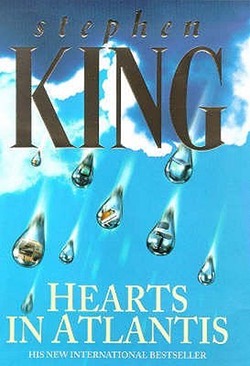 Linked less by plot and more by a general feeling that the Sixties were like lost Atlantis, a glorious era in human achievement that has sunk beneath the waves, leaving behind nary a trace (except for a few crazy people who won’t shut up about how wonderful it all was), Hearts in Atlantis begins with the longest novella in the book, and its best:
Linked less by plot and more by a general feeling that the Sixties were like lost Atlantis, a glorious era in human achievement that has sunk beneath the waves, leaving behind nary a trace (except for a few crazy people who won’t shut up about how wonderful it all was), Hearts in Atlantis begins with the longest novella in the book, and its best:
Low Men in Yellow Coats
Clocking in at around 320 pages, “Low Men in Yellow Coats” is a novel-sized novella set in that special Stephen King version of the Sixties, familiar from novellas like “The Body,” that’s dripping with nostalgia but keeps clocking you over the head with the hard realities of class. Bobby Garfield is 11 and he’s a big reader, wants a bike, and loves baseball. He’s also desperate for a dad. When sixty-something Ted Brautigan moves into the top floor of Bobby’s mom’s boarding house it’s not long before he’s is cast in that role. Brautigan’s place as Bobby’s surrogate father figure is complicated by Brautigan’s psychic powers and the fact that he’s on the run from a group of dangerous fellows he describes as “low men in yellow coats.”
There’s no reason for this story to be so long. When Ted takes Bobby to see Village of the Damned we get a two-page blow-by-blow of the movie’s plot. Ted hires Bobby to read the newspaper to him and there’s a long, long…long scene of him reading an article about boxing to Ted simply so King can shoehorn in one of his made-up words from the Dark Tower lexicon (ka-mai in this case). But this story is also such a special snowflake that you don’t want King to mess with any of it in case he upsets its delicate balance.
 Bobby and Ted’s relationship is in danger not just from the low men, but also from the story’s most compelling character, Bobby’s mom. A single mother, her protectiveness of Bobby verges on paranoia, but she’s also tough-as-nails which is why the fact that she’s being forced to put out for her boss even more shocking. Bobby doesn’t grasp the implications of her relationship with Mr. Biderman, but the reader does and it’s beyond sad.
Bobby and Ted’s relationship is in danger not just from the low men, but also from the story’s most compelling character, Bobby’s mom. A single mother, her protectiveness of Bobby verges on paranoia, but she’s also tough-as-nails which is why the fact that she’s being forced to put out for her boss even more shocking. Bobby doesn’t grasp the implications of her relationship with Mr. Biderman, but the reader does and it’s beyond sad.
There are two pages in here where it might help to know something about the Dark Tower books, but that’s more of an annoyance than a full blown flaw. The writing here is King at his most poignant (when Bobby waves goodbye to his mother he has “a bone in his heart”), and there’s a genuine tension to the approach of the low men, heralded by secret signs and symbols such as moons and stars chalked on the sidewalk and lost pet notices posted in stores. In the last pages, the book jumps into the future, and it’s heartbreaking to read that this bright, brave, good kid grows up to be a shiftless juvenile delinquent. The child is father to the man, but sometimes it hurts to watch it happen.
Hearts in Atlantis
Based on King’s time at the University of Maine in Orono, “Hearts in Atlantis” is narrated by Pete Riley, a freshman student who, along with the rest of his incoming class, needs to maintain his GPA and not flunk out in order to avoid the draft. It is not to be. A craze for playing Hearts burns through their dorm like wildfire, and everyone, Pete included, starts staying up all night in marathon Hearts sessions, not so much for the money but to hide from the increasingly chaotic world around them as the peace movement comes to their blue collar corner of Maine.
 As the kids self-destruct, flunking out of school one after the other and getting shipped overseas to be shot, the story becomes a grim march towards the cliff and Pete Riley is next. The one thing that saves him, and the connection to “Low Men in Yellow Coats,” is his relationship with Carol Gerber. She was Bobby Garfield’s childhood girlfriend in “Low Men” and here she and Pete have a brief fling before she drops out of school to take care of her family. Her warnings get Pete off Hearts, but as the story ends the human toll of the game is high, and we learn that Carol wound up joining the peace movement where she fell under the influence of its militant wing and bombed a recruitment office, resulting in several deaths.
As the kids self-destruct, flunking out of school one after the other and getting shipped overseas to be shot, the story becomes a grim march towards the cliff and Pete Riley is next. The one thing that saves him, and the connection to “Low Men in Yellow Coats,” is his relationship with Carol Gerber. She was Bobby Garfield’s childhood girlfriend in “Low Men” and here she and Pete have a brief fling before she drops out of school to take care of her family. Her warnings get Pete off Hearts, but as the story ends the human toll of the game is high, and we learn that Carol wound up joining the peace movement where she fell under the influence of its militant wing and bombed a recruitment office, resulting in several deaths.
Blind Willie
The weakest of the bunch, “Blind Willie” was published in the journal Antaeus in 1994 and again in King’s self-published Six Stories in 1997. It was revised for both versions, and again for Hearts in Atlantis but it’s still basically an extended metaphor about guilt and contrition. Willie Shearman is a Vietnam vet who was temporarily blinded in a firefight while saving John Sullivan, who was Carol Gerber’s boyfriend in “Hearts in Atlantis” and she and Bobby Garfield’s childhood pal in “Low Men in Yellow Coats.” Shearman was one of the bullies from “Low Men” who tormented Bobby Garfield and, at one point, dislocated Carol’s shoulder.
Every day around the time he was blinded, Shearman goes to his secret office in Manhattan, writes an apology to Carol (his apologies fill dozens of books), disguises himself as a beggar, and panhandles on the streets. He supports his lavish lifestyle with the money he makes from this scam. I’m not sure when a metaphor is so bald that it just becomes heavy-handed explanation, or so literal that it’s no longer a metaphor at all, but that’s the point at which “Blind Willie” exists. Readable, it never pays off the curiosity that carries the reader from page to page. Like the worst in literary fiction it’s oblique, obvious, unable to couple reality to the imagination, and substitutes plodding symbolism for the more subtle pleasures of plot and character.
Despite also featuring a heavy metaphorical sequence, “Why We’re in Vietnam” is no “Blind Willie.” The shortest story in the book (before the next one which is more of an epilogue) it picks up with John Sullivan, now a successful, middle-aged car salesman attending a funeral for a fellow Vietnam vet. There he meets his former CO, Diefenbaker, and the two commiserate over how the new generation is rotten, which leads them to talk about how their generation squandered the promise of the Sixties and sold out the potential of Atlantis for a paycheck, job security, and a life of disengagement.
Upset, Sullivan heads home and gets stuck in a traffic jam. In another car he sees a driver who looks like Carol Gerber and is therefore distracted when a lampshade falls from the sky. Next comes a microwave, a phone, then a piano, then more and more Goodyear tires, barbecue grills, and sheet music, bombarding the traffic jam and smashing cars to bits. In the midst of this hailstorm of consumer goods, Sullivan suffers a fatal heart attack and the reader realizes that this rain of objects was his dying hallucination. The symbolism isn’t as nakedly literal as it was in “Blind Willie” and a man surviving his brush with death in Vietnam only to die amid a shower of suburban detritus feels more surprising and inventive rather than hackneyed and belabored.
Heavenly Shades of Night Are Falling
More of an epilogue than a full-blown story, this brief conclusion sees Bobby Garfield return to his hometown for the first time in years to attend John Sullivan’s funeral. There he runs into Carol Gerber who has settled down, and as dusk falls they sit next to each other and reminisce about the past, with a hint that a romantic relationship, however fragile, might be starting again. It’s a sweet little vignette, but it also brings up the biggest flaw in the book.
 Throughout Hearts in Atlantis, Carol has been a woman cut from the same mold as Lois in Insomnia and Paul Edgecomb’s wife in The Green Mile, practical gals who believe fully in their men, more fantasies of good companions than fully-rounded characters. The fact is, Carol played the good companion to three men in “Low Men in Yellow Coats” and “Hearts in Atlantis” but the more fascinating version of Carol, who grew up, joined the peace movement, committed a terrible crime for what she thought were good reasons, and has had to come to terms with that is nowhere to be found. All that action happens offstage. Instead, in this closing section, she’s gone full circle and is merely an aging version of the girl she was in “Low Men.”
Throughout Hearts in Atlantis, Carol has been a woman cut from the same mold as Lois in Insomnia and Paul Edgecomb’s wife in The Green Mile, practical gals who believe fully in their men, more fantasies of good companions than fully-rounded characters. The fact is, Carol played the good companion to three men in “Low Men in Yellow Coats” and “Hearts in Atlantis” but the more fascinating version of Carol, who grew up, joined the peace movement, committed a terrible crime for what she thought were good reasons, and has had to come to terms with that is nowhere to be found. All that action happens offstage. Instead, in this closing section, she’s gone full circle and is merely an aging version of the girl she was in “Low Men.”
Released in September 1999, the achievement of Hearts in Atlantis was overshadowed by King’s near-fatal car accident in June of that year, and his subsequent painful recovery. The book sold well, but the numbers were low for King, perhaps because most of his press events were canceled after his accident. Hearts only remained on the New York Times bestseller list for 16 weeks, never making it to number one thanks to J.K. Rowling’s Harry Potter series dominating bookstores at the time. But Hearts is a naturalistic, literary achievement that’s a rewarding read, fitting neatly in beside to novels (and novellas) like Cujo, “The Body,” and The Girl Who Loved Tom Gordon as some of King’s most successful and ambitious efforts to write fiction that transcended genre. If that all sounds a bit high-minded to you, don’t worry.
Next up: Dreamcatcher. Prepare thyself for shit weasels.
Grady Hendrix has written for publications ranging from Playboy to World Literature Today and his latest novel is Horrorstör, about a haunted Ikea.


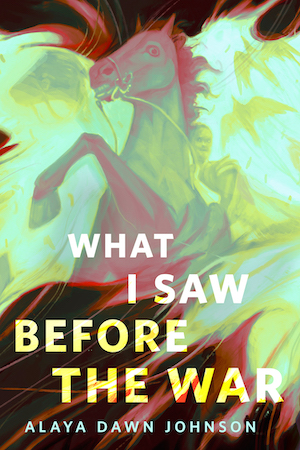
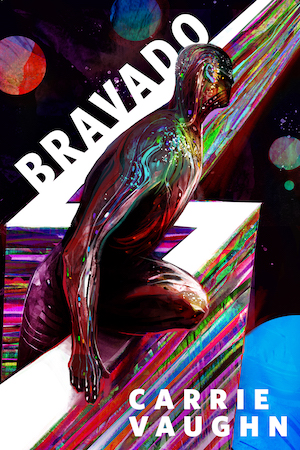






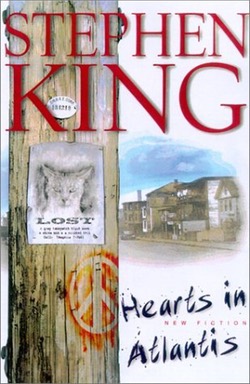
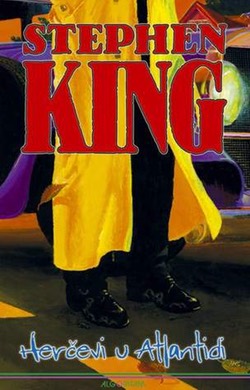
My reading of “Blind Willie” is that, from 2-4pm every afternoon, Willie actually does become blind. He seems to have some kind of PTSD or psychosomatic trauma that actually makes him blind. What was also interesting, although unexplored, was the fact that his wife seems to know about the blindness, as she helped him make his outfit and helps him distribute the money (they keep the bills but anonymous donate bags of coinage to Catholic churches.) And when he thinks that the cop (who he pays off to leave him alone) is getting too nosy, he thinks to himself that neither Willie Shearman nor “Blind Willie Garfield” could actually hurt the cop, but he knew another fellow from his outfit who might — suggesting some element of split personality disorder.
The story may be a bit turgid and obvious, but I think there is more there of interest than you seem to find.
which is why the fact that she’s being forced to put out for her boss
Why don’t you just call it what it is, rape? Because an even worse incident happens later? I mean, what happens to Bobby’s mother is disturbingly common.
Carol wound up joining the peace movement where she fell under the influence of its militant wing
Led by Randall Flagg, or did you miss that connection?
it never pays off the curiosity that carries the reader from page to page.
I disagree. Willie’s guilt over Carol is intimately connected with Ronnie Malenfant’s(Pete’s Hearts nemesis in HiA) breakdown, seeing the parallels between their jumping of Carol and the Ronnie inspired massacre of the Vietnamese village, that led to his blinding. The conclusion where Willie decides he must adopt the persona of Ronnie Melanfant to kill the bribe accepting cop gave me chills.
All the violence against women in this story is closely tied to Lord of the Flies. Bobby “sees” the attack on his mother while dialog from the book interjects into his thoughts, and is paralleled again with the attack on Carol and the village.
@1, The blindness isn’t psychosomatic, he stands in the sun so prolonged exposure makes him temporarily blind. He does it to himself intentionally as part of his penance.
But yes, the fact that his wife is totally aware fascinates me.
@2 exnay on the aggflay. Grady doesn’t like the Dark Tower references, remember.
I love this reread even though I don’t always agree with the analysis, but this time I feel like I’m supposed to be ashamed for loving the book as much as I do.
@@.-@, But that one is a Stand reference, more than it is DT.
@Aeryl The Stand *did* come first, but good ole Flagg is all over the Dark tower. I suppose it is a matter of perspective.
I do enjoy the re-read, but the disdain for the Dark Tower books puts me off of a lot of the commentary, as I’m a large Dark Tower fan. Indeed, though the Stand was what first got me onto King, the Dark Tower is what kept me as a fan.
“Could there be a literary form more twee and precious than Linked Novellas?”
Isn’t that just a fix-up? Those are mostly SFF aren’t they?
Some bits of this article I agree with and some bits I don’t.
And I’m sorry, but this:
just reads like laziness/annoyance rather than valid literary criticism, especially since the reviewer appeared to have really enjoyed the novella.
@Aeryl: Yes, Bobby’s mother is absolutely raped and abused. I always kind of thought that was the reason for his subsequent deliquency, as much (or more) as Ted’s departure.
I also don’t mind the “Tower” tie-ins in King’s work; they go as far back as “The Dead Zone” (ask me more about this when I’ve got the book in front of me, but the number 19 figures prominently in the carnival scene, IRC). I also felt that “Hearts in Atlantis” was a really good portrait of being young and on the edge of adulthood. I was part of a group like that in college – our “drug” was not Hearts but the college gaming club and a LOT of booze – and my partner and I were the only two who “escaped” and went on to be moderately successful. Yet I can’t deny that I often miss those days. I’ve said more than once that King is a Romantic (not in the Harlequin sense but the Wordsworth sense – or maybe more like Coleridge, come to think of it) and I think “Hearts in Atlantis” is a great example of that.
I am really enjoying this re-read and I mean no disrespect to the author, but I don’t like the line “King was capable of cravenly seeking ivory tower acceptance.” I’m not acquainted with Stephen King, but from what I’ve read by/about him, I don’t get the sense that he’s “craven” or that he’s seeking academic acceptance. (Which he already has, BTW – many college classes, including mine, teach King’s work.) I posted elsewhere on this thread about how I kind of understand the drive of talent. I’m not sure King CAN stop writing and his stories – even the less effective ones – are “writ in blood.”